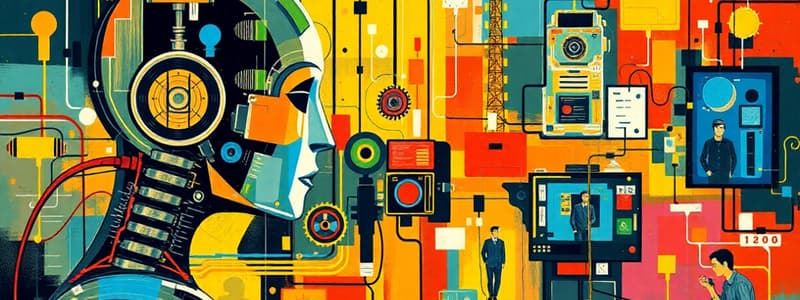Podcast
Questions and Answers
What is one perspective on the impact of automation on the legal industry?
What is one perspective on the impact of automation on the legal industry?
- Overall employment in the legal industry has decreased.
- Automation in the legal industry has resulted in more jobs for legal-support workers. (correct)
- All paralegals will lose their jobs due to software.
- Automation has not changed the overall employment of paralegals and lawyers.
What common misconception about automation does Bessen address?
What common misconception about automation does Bessen address?
- Automation requires higher education levels for all workers.
- Automation improves efficiency but reduces job satisfaction.
- Automation leads to massive unemployment. (correct)
- Automation only affects blue-collar workers.
According to Bessen, why is there a demand for policy changes related to automation?
According to Bessen, why is there a demand for policy changes related to automation?
- To decrease the number of professional workers.
- To support only blue-collar workers losing jobs.
- To limit the use of technology in the workplace.
- To redistribute wealth due to technological unemployment. (correct)
Which statement best reflects the relationship between ATM automation and job growth in related occupations?
Which statement best reflects the relationship between ATM automation and job growth in related occupations?
What was one reported effect of increased computer use on job growth between 1980 and 2018?
What was one reported effect of increased computer use on job growth between 1980 and 2018?
Which term refers to workers in professions that do not require manual labor?
Which term refers to workers in professions that do not require manual labor?
What impact has automation had on professionals outside of blue-collar jobs?
What impact has automation had on professionals outside of blue-collar jobs?
What was one argument made by praise for automation during the Great Recession?
What was one argument made by praise for automation during the Great Recession?
What is the primary concern related to technological unemployment?
What is the primary concern related to technological unemployment?
What is a characteristic of the jobs requiring below-median computer use from 1980 to 2018?
What is a characteristic of the jobs requiring below-median computer use from 1980 to 2018?
What does automation primarily refer to?
What does automation primarily refer to?
What is the claim regarding the impact of automation on employment?
What is the claim regarding the impact of automation on employment?
How has the legal industry been affected by automation according to the evidence provided?
How has the legal industry been affected by automation according to the evidence provided?
What trend has been observed in occupations that rely heavily on computers since the 1980s?
What trend has been observed in occupations that rely heavily on computers since the 1980s?
What is significant about the job growth for paralegals and lawyers since 2000?
What is significant about the job growth for paralegals and lawyers since 2000?
What does the document suggest about the relationship between automation and job displacement?
What does the document suggest about the relationship between automation and job displacement?
What has been proposed as essential for workers in relation to automation?
What has been proposed as essential for workers in relation to automation?
What aspect of automation is highlighted as a paradox in the discussion?
What aspect of automation is highlighted as a paradox in the discussion?
Which statement about the legal discovery process is correct?
Which statement about the legal discovery process is correct?
In what way did automation impact job growth in the legal sector since 2000?
In what way did automation impact job growth in the legal sector since 2000?
Why is it important for workers to adapt to automation according to the document?
Why is it important for workers to adapt to automation according to the document?
How does computer automation affect employment overall?
How does computer automation affect employment overall?
What is a potential future concern regarding computer automation?
What is a potential future concern regarding computer automation?
What is one way that automation can lead to increased employment?
What is one way that automation can lead to increased employment?
Which of the following roles has been reduced due to automation?
Which of the following roles has been reduced due to automation?
What aspect of automation's impact on employment tend to balance each other out?
What aspect of automation's impact on employment tend to balance each other out?
How did ATMs affect employment in banks?
How did ATMs affect employment in banks?
What did the introduction of automation potentially lead to in the legal field?
What did the introduction of automation potentially lead to in the legal field?
Which traditional role has been taken over by graphic designers due to automation?
Which traditional role has been taken over by graphic designers due to automation?
What was a significant observation made during the Industrial Revolution related to automation?
What was a significant observation made during the Industrial Revolution related to automation?
What is the primary concern related to the impact of automation on jobs?
What is the primary concern related to the impact of automation on jobs?
According to McKinsey & Company, what percentage of current jobs are at risk of complete automation in the near term?
According to McKinsey & Company, what percentage of current jobs are at risk of complete automation in the near term?
How has the role of bank tellers evolved due to automation?
How has the role of bank tellers evolved due to automation?
What does the author predict regarding the future of artificial intelligence-driven software?
What does the author predict regarding the future of artificial intelligence-driven software?
What is the net effect of automation on unemployment according to research?
What is the net effect of automation on unemployment according to research?
What must workers do to keep pace with the changing nature of work due to automation?
What must workers do to keep pace with the changing nature of work due to automation?
What area does automation primarily impact according to the research?
What area does automation primarily impact according to the research?
What is considered essential for addressing the challenges posed by automation?
What is considered essential for addressing the challenges posed by automation?
What role do community colleges play in relation to automation?
What role do community colleges play in relation to automation?
What approach is suggested to effectively manage the impacts of automation?
What approach is suggested to effectively manage the impacts of automation?
What misconception might workers have about the effects of automation?
What misconception might workers have about the effects of automation?
Flashcards are hidden until you start studying
Study Notes
Automation's Impact
- Automation impacts both blue-collar and professional workers.
- Some believe automation is a contributing factor to the slow economic recovery from the Great Recession and a decline in the middle class.
- There is concern that automation is leading to unemployment, and thus policies to redistribute wealth are needed.
- Fears of job loss due to automation may be unfounded, as workers can adapt and learn new skills.
Case Studies
- The legal industry has been impacted by automation, with software doing tasks previously done by lawyers.
- Despite automation, employment of paralegals and lawyers remains strong, and the legal support workforce has grown.
- The financial industry has experienced increased automation, with ATMs initially raising concerns.
- Despite automation, workers in finance-related occupations have increased.
- Growth in computer usage is correlated with job growth.
Automation and Employment
- Automation, while potentially displacing workers in some occupations, can lead to increased employment opportunities in the long run, especially with adaptation to new computer tools.
- This claim is supported by the legal profession, which has experienced significant job growth despite increased automation, notably in legal discovery.
- The legal industry has seen job growth in paralegals and lawyers exceeding the overall labor force growth since 2000.
- Over 50,000 jobs were added in paralegal and legal support roles since 2000, and the number of lawyers increased by more than a quarter of a million.
- Occupations with high reliance on computers have experienced considerably faster growth than other job sectors since the 1980s.
- The paradox arises because automation often raises concerns about job loss, but the text argues that it can drive employment growth in specific industries like the law with proper adaptation and skill development.
- The legal industry is presented as a case study of computer-assisted legal discovery (e-discovery), demonstrating how automation can increase efficiency and create new roles.
Automation and Employment
- Computer automation can reduce employment in some roles (e.g., telephone operators) but create new ones (e.g., receptionists).
- Automation can lead to lower prices, attracting more customers and increasing demand, creating new jobs in related areas (e.g., legal firms).
- The net impact of computer automation on employment is often negligible.
- Future advancements in artificial intelligence (AI) might significantly alter the picture as AI becomes more capable.
Examples of Automation Impact
- ATMs reduced bank branch needs but may have increased demand in other areas, expanding bank reach.
- Automation in legal documents increased research and created new jobs in legal fields.
- Graphic design automation replaced typographers with graphic designers.
Conclusion
- The text highlights that automation is a complex process that can impact jobs across fields.
- The overall effect on employment is not straightforward and may depend on various factors, including related technological expansions.
- The Industrial Revolution and the introduction of computer systems are examples of how technology can impact employment in complex ways.
Automation and the Job Market
- Automation can both create and eliminate jobs
- Research suggests automation has a negligible impact on overall unemployment
- Future generations of AI-powered software are predicted to have a more significant impact on the job market
- A McKinsey & Company study suggests that only 5% of current jobs are at risk of complete automation in the near future
- Automation is more likely to redefine existing jobs rather than eliminate them entirely
- Workers will need to acquire new skills to adapt to the evolving job market
- The role of bank tellers has evolved to include marketing financial products, demonstrating how jobs are redefined by automation
- The main challenge posed by automation is not job elimination, but the need for workers to adapt to new skill demands
Automation and its Impacts
- Automation's impact on the job market is significant and transformative.
- Automation is replacing jobs, especially low-skill and low-paying ones.
- Workers with limited skills are likely to be most impacted by automation.
- The author emphasizes the need for collaborative solutions to address the challenges of automation, including:
- Working with local employers
- Creating work-study training programs
- Certifying skills based on experience
- Raising awareness of the issue
Addressing the Challenges of Automation
- Community colleges and trade groups are vital for training workers in skills needed for emerging jobs.
- Focus on practical solutions and training rather than creating unnecessary panic.
- Policies should focus on training, collaboration, and skills development to effectively navigate the future of work.
Studying That Suits You
Use AI to generate personalized quizzes and flashcards to suit your learning preferences.




